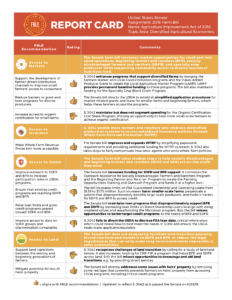Written by Tess Pocock for FBLE.
The Senate passed its farm bill, the Agriculture Improvement Act of 2018 (S. 3042), on Thursday, June 28th. The bill is a mixed bag for efforts to build local, resilient agricultural systems that create meaningful opportunities for diverse farmers. FBLE’s report, Diversified Agricultural Economies, makes farm bill recommendations to achieve a more just farm system by ensuring socially disadvantaged farmers and ranchers (SDFR) and beginning farmers and ranchers (BFR) have access to retail markets, credit, agricultural insurance, and land. This post, and the accompanying report card, highlights how the Senate bill stacks up against FBLE’s recommendations.
Access to Markets
 The farm bill should expand programs that help producers meet growing demand for local, sustainably produced, and nutritious foods. Toward this end, and in contrast to the House bill, S. 3042 safeguards and even enhances the Farmers Market and Local Food Promotion Program (FMLFPP). In its current form, FMLFPP provides grants to farmers’ markets, businesses, and organizations that make direct links between producers and customers. The Senate bill combines FMLFPP with the Value-Added Producers Grant Program (VAPG) (which helps farmers increase the value of their agricultural products, such as turning milk into cheese) to create the Local Agriculture Market Program (LAMP). LAMP preserves the goals of both programs while creating permanent baseline funding of $60 million per year, making the future of both programs more secure.
The farm bill should expand programs that help producers meet growing demand for local, sustainably produced, and nutritious foods. Toward this end, and in contrast to the House bill, S. 3042 safeguards and even enhances the Farmers Market and Local Food Promotion Program (FMLFPP). In its current form, FMLFPP provides grants to farmers’ markets, businesses, and organizations that make direct links between producers and customers. The Senate bill combines FMLFPP with the Value-Added Producers Grant Program (VAPG) (which helps farmers increase the value of their agricultural products, such as turning milk into cheese) to create the Local Agriculture Market Program (LAMP). LAMP preserves the goals of both programs while creating permanent baseline funding of $60 million per year, making the future of both programs more secure.
Thriving and diversified agricultural economies can succeed by providing access to nutritious food grown using sustainable practices. For this reason, FBLE recommends policies that support the production and marketing of “specialty” crops and organic agriculture. Although many of the crops we eat–such as fruits, vegetables, and nuts–are specialty crops, the farm bill devotes the vast majority of agricultural spending to commodity programs. In contrast, FBLE recommends strengthening support for farmers who grow real food. Unlike the House bill, S. 3042 maintains funding for the Specialty Crop Block Grant Program, which boosts specialty crop competitiveness.
Organic Certification can be a valuable asset, but may be cost prohibitive for smaller-scale farmers. The Senate bill maintains funding for the Organic Certification Cost Share Program (OCCSP), which aims to defray the cost of the certification. FBLE encourages increasing the cost share percentage from 75% to 90%, particularly for SDFR and BFR. However, since the House draft eliminated the program’s budget entirely, maintaining the program at least preserves this important initiative.
S. 3042 also maintains funding for business and community development programs including the Rural Cooperative Development Grant Program, Business and Industry Local Food Loans, Rural Business Investment Program, and the Rural Community Development Initiative Grants. Diversified agricultural economies rely on keeping people and wealth in rural communities.
Access to Credit
Because farming is an expensive endeavor and startup costs prevent many from entering the occupation, access to credit is crucial. For over a century, accessing farm credit in the United States has been doubly difficult for women farmers, black farmers, Native American farmers, and other farmers from minority (or “socially disadvantaged,” to use USDA’s term) communities. This is evidenced by the fact that, in the United States, farmers from minority populations own less than 4 percent of all private agricultural land and women account for just 14 percent of all principal farm operators. As we show in Diversified Agricultural Economies, these socially disadvantaged farmers have had disproportionately less access to credit under decades of racist and sexist lending practices in USDA programs. USDA has recognized the structural inequity in its program delivery, and FBLE recommends strengthening USDA efforts to improve outreach, increase loan target participation rates, and improve data and transparency surrounding lending practices.
Toward this end, the Senate bill increases funding for key programs. S. 3042 combines two programs—the Outreach Assistance for Socially Disadvantaged Farmers and Ranchers Program (Section 2501) and the Beginning Farmer and Rancher Development Program (BFRDP)—to create the Farming Opportunities Training and Outreach Program (FOTOP). BFRDP provides support through grants in an effort to equip the next generation of farmers with the skills necessary to make a living in farming. Section 2501 provides similar support to minority and military veteran farmers. In the Senate bill, the combined program FOTOP receives $50 million per year in permanent baseline funding, split evenly between the two pre-existing programs. This represents a $15 million annual increase for minority and veteran farmers and a $5 million annual increase for beginning farmers and aligns with FBLE’s recommendation.
Outreach and technical assistance only work if farmers can get the capital they need to invest in their operations. Unfortunately, the Senate bill ensures that fewer and larger farms, especially concentrated animal feeding operations, will continue to monopolize more of the available farm credit that small, beginning and diversified farmers need. During markups of the bill, the Senate Agriculture Committee approved amendments to increase limits on FSA Guaranteed Ownership and Operating Loans from $1.39 to $1.75 million. These increases are harmful to small and mid-sized farmers because they enable larger farms to exhaust the loan funds’ limited resources, and this action is contrary to FBLE’s recommendations.
On the positive side, the amendments also increase limits on Direct Ownership Loans from $300,000 to $600,000. Direct Ownership Loans help farmers purchase their own farm, and the program includes target participation rates for SDFR and BFR to help ensure their access to credit. Over past years, loan limits have not kept pace with increasing land ownership costs. Increasing this limit to allow borrowers to meet their funding needs aligns with FBLE’s recommendation. The Senate bill also aligns with FBLE recommendations of reauthorizing the FSA Microloan program, a very successful and streamlined program by which SDFR, BFR, and others can obtain loans of up to $50,000.
Access to Insurance
Risk management is fundamental in supporting diverse production systems. Small and diverse farms are not adequately served by traditional yield insurance and revenue insurance. Specifically, without proof of insurance, farmers may be precluded from accessing the credit they need to operate their farms. The Whole Farm Revenue Protection program, available nationwide, was a pilot project established to provide much-needed risk management to small and diverse farms by covering all commodities on the farm under a single policy.
In alignment with FBLE recommendations, the Senate bill makes important changes to WFRP that will help more diversified farms get the insurance they need. For example, S. 3042 simplifies the application and reporting requirements that have prevented broader participation in the program. Since the program remains relatively new, writing WFRP can be unfamiliar and therefore more time intensive and costly for insurance agents writing the policies. Importantly, the Senate bill incentivizes writing WFRP policies by providing additional compensation to insurance agents such that a reimbursement is available if the compensation under the policy is below $1,000. These improvements to WFRP will support diverse production systems by increasing access to risk management and, as a result, improving access to credit.
Access to Land
With the average age of principal farm operators around 58, the 2018 farm bill must advance creative strategies to shift land ownership to the next generation of farmers. In particular, throughout the USDA’s 150-year history, USDA policies have prevented minorities and women from owning agricultural land and transferring their land to successive generations. Though historical inequities cannot be undone and much of the harm caused is irreversible, the farm bill has the capacity to advance equity for socially disadvantaged farmers.
In an effort to accelerate land ownership transitions to SDFR and BFR, FBLE recommends providing aging farmers incentives to promote such transfers. The Conservation Reserve Program Transition Incentive Program (CRP-TIP) has already made inroads toward this goal, with the caveat that the program targets transfer of farmland that is by definition marginal. A farmer receiving payments for converting agricultural land for conservation purposes may receive an extension of payments when the farmer transitions land under CRP contract to SDFR or BFR. This model encourages necessary transitions, and enhances the likelihood that a farmer will preserve the land for agricultural purposes rather than sell it for development. The Senate bill’s funding increase for the program from $33 million to $50 for fiscal years 2018–2023 aligns with FBLE recommendations.
FBLE support any steps that will meaningfully mitigate the issues associated with heirs’ property. Land owned by farmers who die without a will is split between the decedent’s heirs. Through successive generations, this may result in a lot (dozens or even hundreds) of heirs sharing ownership of the same piece of land. Often, heirs’ property status prevents a farmer from securing clear title, which means USDA resources are inaccessible. The Senate bill takes steps to improve producers’ ability to farm on heirs’ property by directing FSA to simplify the process of securing a farm number, loans and other programs on heirs’ property. The bill also directs the USDA to conduct research on farmland tenure. These steps align with FBLE recommendations, by improving USDA services including credit and insurance, and ultimately helping producers use the heirs’ property.
Looking Ahead
The Senate farm bill maintains crucial funding for programs which support diversity and bouy a more just farm system, integrating various FBLE recommendations. S. 3042 is a bipartisan effort; however, the Senate now faces an uphill battle of reconciling S. 3042 with its sharply contrasted House counterpart. FBLE will be monitoring the conference process in the hope that the important support for diversified agricultural economies included in the Senate bill will be included in the final text that comes out of committee.


Health Law & Policy, Commentary
Cuts to the Federal Workforce and Medicaid: What’s Happening and What Can Advocates Do? – Health Care in Motion
March 12, 2025